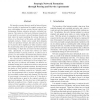206 search results - page 33 / 42 » Computing Equilibria in Anonymous Games |
147
click to vote
FOCS
2006
IEEE
15 years 6 months ago
2006
IEEE
We introduce a game theoretic model of network formation in an effort to understand the complex system of business relationships between various Internet entities (e.g., Autonomou...
CG
2010
Springer
14 years 10 months ago
2010
Springer
We used in the past a lot of computational power and human expertise for having a very big dataset of good 9x9 Go games, in order to build an opening book. We improved a lot the al...
105
Voted
BIRTHDAY
2009
Springer
15 years 7 months ago
2009
Springer
We introduce a new class of games, asynchronous congestion games (ACGs). In an ACG, each player has a task that can be carried out by any element of a set of resources, and each r...
CORR
2008
Springer
15 years 1 months ago
2008
Springer
Population protocols have been introduced as a model of sensor networks consisting of very limited mobile agents with no control over their own movement: A collection of anonymous ...
ICS
2010
Tsinghua U.
15 years 10 months ago
2010
Tsinghua U.
: Many natural games can have a dramatic difference between the quality of their best and worst Nash equilibria, even in pure strategies. Yet, nearly all work to date on dynamics s...

